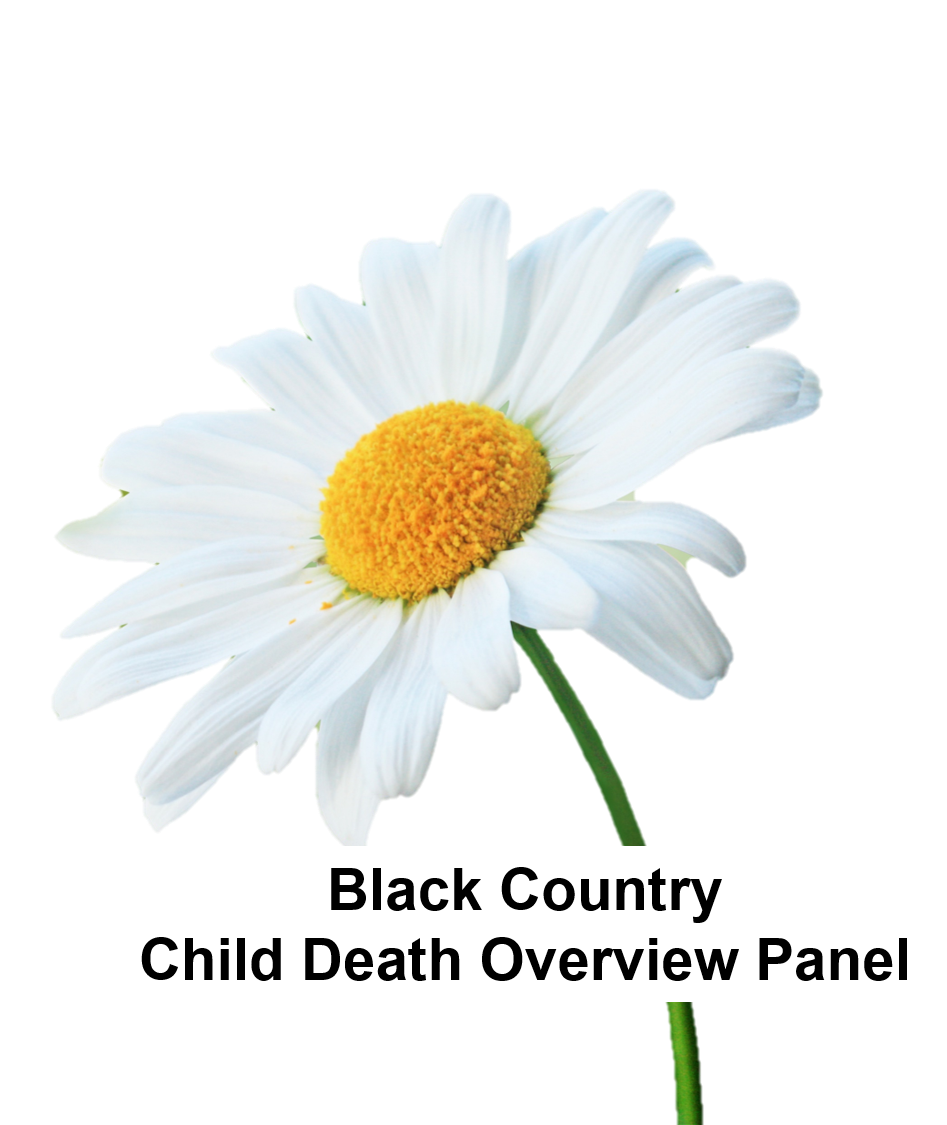What is the Child Death Overview Panel?
The Black Country Child Death Overview Panel (CDOP) has been set up by Child Death Review partners, including:
- City of Wolverhampton Council
- Dudley Metropolitan Borough Council
- Sandwell Metropolitan Borough Council
- Walsall Metropolitan Borough Council
- NHS Black Country Integrated Care Board
The purpose of the CDOP is to ensure a review of all child deaths (excluding both those babies who are stillborn and planned terminations of pregnancy carried out within the law) up to the age of 18 years, normally resident in Black Country, irrespective of the place of their death.
The Black Country CDOP will adhere to the statutory guidance: Child Death Review Statutory and Operational Guidance (England) (publishing.service.gov.uk).
Within the Black Country, these reviews will be undertaken by operational panels, neonatal and paediatric, and report to the Strategic Partnership, which will identify actions and recommendations for strategic partners. The over-riding purpose of reviewing all child deaths is to reduce the risk of future deaths or harm to children.
The Strategic Partnership meets four times a year to ensure the statutory function of the CDOP and the whole local Child Death Review process is effective and highlights any concerns for escalation.
The Strategic Partnership is chaired by an independent chair and supported by the CDOP coordinator. The Strategic Partnership are responsible for setting the budget, structure, and making recommendations to specific services in response to the data, good practice, learning and modifiable factors that are shared from the CDOP.
Contact us
To contact the Black Country Child Death Overview Panel team, please email bcicb.
Following the death of a child, a formal notification of the death should be shared with the CDOP team as soon as possible, ideally within 48 hours.
A child death notification can be completed by any professional involved with the death of a child. For ease, the notification form is accessible online as a public facing document.
To notify a child death please use: www.
Chapter 5 of the Child Death Overview Panels Statutory and Operational Guidance (2018), sets out the key features of a good Child Death Review (CDR) process to be followed by all organisations involved with the process of child death reviews as of 1st April 2019.
The Department of Health & Social Care have taken over statistical analysis of Child Death Review data from the Department for Education as of April 2019. Greater regionalisation of child death reviews was encouraged, and further work undertaken to develop a national database. The Department of Health will disseminate relevant learning to Local Safeguarding Children’s Partners.
The Child Death Review (CDR) process is an analysis of deaths of children who die in England from birth up to 18 years of age. There is a statutory requirement for the statutory partners to make arrangements to carry out child death reviews. The aim of the CDR is to ensure the information is systematically captured for every death to enable learning and prevent future deaths, as identified in the Child Death Review Statutory and Operational Guidance (England) (publishing.service.gov.uk)
The purpose of a CDR is to identify any matters of concern affecting the safety and welfare of children relating to the death(s) and to consider any action or recommendations that can be take or developed based on a death, or a pattern of deaths to identify trends that require a multidisciplinary response.
A Joint Agency Response (JAR) would be triggered when a child’s death, or the collapse leading to death would not have been expected to occur 24 hours previously.
Criteria for a JAR includes the following:
- the death is or could be due to external causes
- the death is sudden and there is no immediately apparent cause
- the death occurs in custody or where the child has been detained under the Mental Health Act
- where the initial circumstances raise any suspicions that the death may not have been natural
- in the case of a stillbirth where no healthcare professional was in attendance.
Any death that is both sudden and unexpected might be referred to as Sudden, Unexpected Death of an Infant/Child (SUDIC) at the point where the child dies. Following a post mortem and full investigation, these deaths might go on to be explained by for example infection, cardiac or metabolic condition or even homicide. At the point of review, the death would be categorised as the appropriate cause of death.
If after full investigation the death remains unexplained, it would be referred to as Sudden Unexplained Death in Infancy (SUDI) or Sudden Unexplained Death in Childhood (SUDC). Infancy refers to a child being under the age of one at the time of death, and childhood refers to those who are over the age of one at the time of death.
Child Death Overview Panel is informed by the referral of a standardised report completed during a Child Death Review Meeting (CDRM). The meetings are attended by professionals who were directly involved in the care of the child during their life, the parents life and/or siblings and any professional involved during the child’s death.
At this meeting a formal agenda is followed to ensure all matters related to the child are discussed. The professionals in attendance at the CDRM vary dependent on the circumstances of the child death and is not limited to medical staff.
During this meeting any contributory factors are discussed, and modifiable factors are identified. The learning and any actions as a result of the learning will be highlighted and support available for those within the meeting. The support the family have received, accessed, or been offered is explored.
An important part of the CDRM is the opportunity for professionals to share any comments or questions on behalf of the parents/family that may have been raised at the time of death or during the CDR Process. Parents would not attend the CDRM, but they should be informed that the meeting is taking place and given the opportunity to share their feedback into the Child Death Review Process.
The Child Death Overview Panel (CDOP) is a multi-agency panel set up to conduct the independent scrutiny on behalf of the local Child Death Review (CDR) partners on the reviews of all deaths of children who are normally resident in the Black Country to learn lessons and share findings for the prevention of future child deaths.
The review at CDOP is intended to be the final scrutiny over a child’s death. The CDOP membership includes representation from a range of organisations with knowledge and expertise in fields such as public health, childrens services, police, education, paediatrics etc.
Members support the review of each case that is referred into CDOP and factors relevant to the child’s vulnerability or death are agreed within each of the four domains and a level of relevance is agreed for each factor;
- 0: Information not available
- 1: No factors identified, or factors identified but are unlikely to have contributed to the death
- 2: Factors identified that may have contributed to vulnerability, ill health, or death
At CDOP for each case a category of death is agreed, this may be one category of death or multiple dependent on the final cause of death.
There are no words that can make a child death right. However, we strongly believe it is important that following such a devastating loss, there should not be any further preventable distress with a focus to make information as clear as possible and a clear point of contact for any questions the family may have. You can download the When a Child Dies leaflet here shortly.
The National Child Mortality Database (NCMD) records comprehensive data standardised across the whole country (England), on the circumstances of children’s deaths. The purpose of collating information nationally is to ensure that deaths are learned from, that learning is widely shared and that actions are taken, locally and nationally, to reduce the number of children who die.
The NCMD programme was established and is delivered by the University of Bristol, in collaboration with the University of Oxford’s National Perinatal Epidemiology Unit (NPEU), University College London (UCL Partners) and the software company QES. It also includes representation from bereaved families through the NCMD charity partners: Child Bereavement UK, The Lullaby Trust, and Sands. The programme is funded by NHS England and commissioned by Healthcare Quality Improvement Partnership (HQIP).
From 1 April 2019, it has been mandatory for Child Death Review Partners to input data on all child deaths into the NCMD. In the Black Country, the programme used to support the Child Death Review process is eCDOP which is a programme developed by QES (a software company). QES provide eCDOP to 99% of the areas involved in the Child Death Review process in England.
eCDOP supports the CDR process by allowing agencies to share information following the death of a child, to ensure appropriate action and processes are followed then reviewed and cases are then referred to CDOP for final oversight and scrutiny of every child death. eCDOP allows notifications of a child death in real-time, without sharing confidential information over email, to ensure no delay in the transfer of information and triggering of the process required on receipt of a child death notification.
Annual Report
The Child Death Overview Panel (CDOP) publishes its Annual Report to provide an overview of local patterns and trends related to child deaths and to share recommendations as a result of the review process for local Partners to action.
BCCDOP Annual Report 2023/2024
This is the fifth annual report for the Black Country Child Death Overview Panel (BCCDOP). This report will explore the statistical and qualitative conclusions from child death data across the Black Country which includes Dudley, Sandwell, Walsall and Wolverhampton from 1 April 2023 – 31 March 2024.
Previous annual reports:
BCCDOP Annual Report 2022/2023.
Shared Learning
Learning lessons from child deaths cases is a priority for the Black CDOP to ensure this learning is shared widely across the Black Country as well as regionally and nationally. With child deaths being reviewed across the Black Country footprint, there may be an opportunity to highlight emerging themes.
CDOP is held on a regular basis, with a themed panel addressing all Neonatal cases (0-27 days) on a bi-monthly basis. This arrangement allows for obstetricians and neonatologists to be invited from neighbouring areas to provide an independent scrutiny of cases as well as inform the discussions during the review process and highlight themes and learning locally. The panel on the alternate month reviews cases of child death from 28 days of age up to 18 years old.
The CDOP is responsible for identifying modifiable factors. These modifiable factors would not mean the death was preventable, but there may be emerging trends that could reduce the risk of future child deaths. Where a factor in one of the domains has been identified as a possible increase to the child’s vulnerability or contributed to the child’s death, the Panel can discuss if there is a local and/or national intervention in place or that could be recommended to reduce the risk of future child deaths.
- Working Together to Safeguard Children 2023 (publishing.service.gov.uk)
- Child Death Review Statutory and Operational Guidance (England) (publishing.service.gov.uk)
- NCMD | The National Child Mortality Database
- Brain tumours in children - information for clinicians
- Safeguarding Partnerships websites;
- Dudley Safeguarding People Partnership: Home - Dudley Safeguarding People Partnership
- Sandwell Children’s Safeguarding Partnership: Home - Sandwell CSP
- Walsall Safeguarding Partnership: Home | Walsall Safeguarding Partnership
- Wolverhampton Safeguarding Together: Home - Wolverhampton Safeguarding Together




